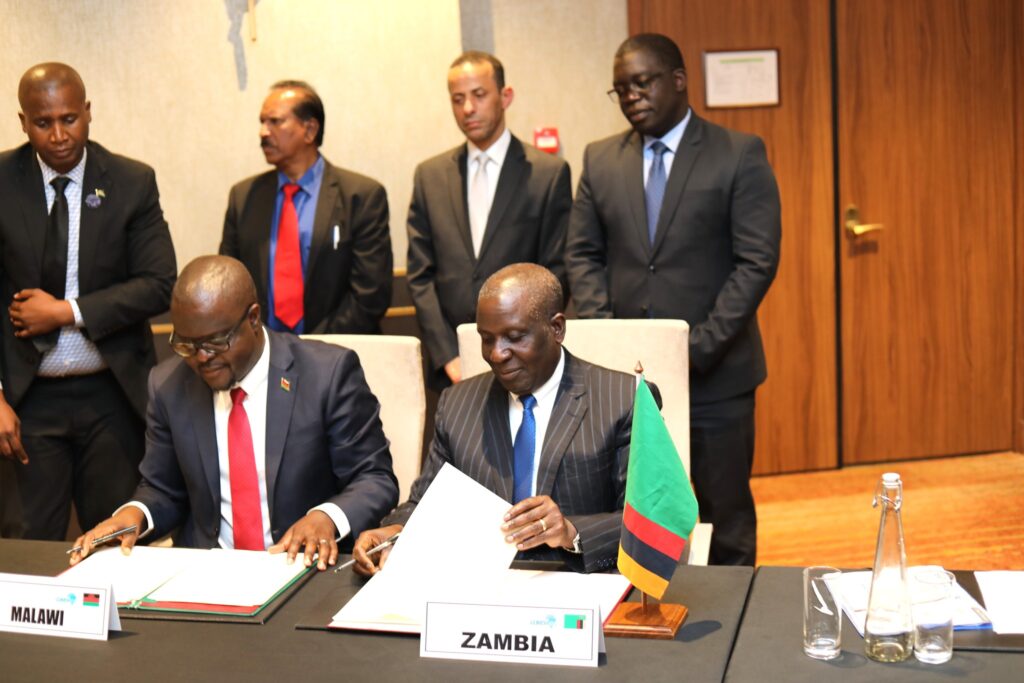Malawi and Zambia Sign Landmark Agreement to Boost Agricultural Trade
Malawi and Zambia have signed a landmark Sanitary and Phytosanitary Mutual Recognition Agreement (MRA) aimed at dismantling agricultural trade barriers, harmonising regulatory standards, and expanding market access between the two neighbouring countries.
Facilitated by the Common Market for Eastern and Southern Africa (COMESA), the agreement commits both nations to mutually recognise each other’s inspection and certification protocols for plant products. The new framework is expected to reduce redundant procedures, cut trade costs, and minimise delays at border crossings.
Zambia’s Minister of Agriculture, Reuben Mtolo Phiri, hailed the pact as a “significant milestone” for regional integration with strong potential to accelerate agricultural exports and stimulate economic growth.
“This agreement embodies trust, collaboration, and smart regulation,” said Mr Phiri. “If we simplify trade, we empower our farmers, bolster our economies, and lay a foundation for the future.”
Mr Phiri stressed that harmonised sanitary and phytosanitary measures would protect plant health while enabling the smooth movement of goods. He added that the MRA would offer farmers and traders easier market access, reduce technical barriers, and protect against the spread of pests and diseases.
The Zambian minister also commended technical working groups from both countries for their efforts in drafting the agreement and confirmed that Zambia is finalising similar deals with Zimbabwe and other regional partners.
At the signing ceremony in Lusaka, Malawi’s Minister of Agriculture, Vitumbiko Mumba, highlighted that the agreement would eliminate costly and time-consuming duplicate inspections, testing, and certifications.
“Experience shows that products often undergo repeated conformity assessments—even after being inspected and certified in their country of origin,” said Mr Mumba. “This redundancy increases costs and diminishes the competitiveness of especially small and medium enterprises.”
The agreement, supported by the Alliance for a Green Revolution in Africa (AGRA), the UK’s Foreign, Commonwealth and Development Office (FCDO), the Bill & Melinda Gates Foundation, and other partners, covers key crops including sorghum, beans, soybeans, rice, and groundnuts.
Mr Mumba emphasised that the signing marked “the beginning of an implementation journey” and urged both countries to devise sustainable strategies beyond donor funding, with active engagement from the private sector.
The Malawi–Zambia MRA is part of a broader regional pilot involving six COMESA member states—Malawi, Zambia, Zimbabwe, Kenya, Uganda, and Rwanda—focused on streamlining trade in key agricultural commodities through mutual recognition of conformity assessments.
COMESA Assistant Secretary General for Programmes, Mohamed Kadah, noted that duplicative conformity assessments were a major challenge for regional traders, inflating costs and restricting trade. “The benefits will only be realised through effective and sustainable national-level implementation,” he warned.
The UK government, which has invested over £1 million in MRA-related activities as part of its £35 million Africa Foods Trade and Resilience programme, also voiced strong support. British High Commissioner to Zambia, Rebecca Terzeon, described the agreement as “a powerful commitment to facilitating trade, strengthening food security, and creating economic opportunities for smallholder farmers, youth, and women.”
AGRA’s Director of Inclusive Market Trade and Finance, Dr Daniel Njiwa, called the deal likely the first of its kind in African agriculture, commending both governments for engaging the private sector throughout the five-year negotiation process.
COMESA Assistant Secretary General for Administration and Finance, Devi Haman, underlined the potential of the agreement to increase intra-COMESA trade—currently valued at about $14 billion—to at least $100 billion, or around 20 percent of total trade in the bloc.
The MRA aligns closely with the goals of the African Continental Free Trade Area (AfCFTA), aiming to dismantle non-tariff barriers, improve competitiveness, and strengthen regional integration.
“This signing signals a new era in trade procedures between Malawi and Zambia and reflects progress toward a borderless COMESA community,” Mr Haman said.
With Africa’s population projected to reach 2.2 billion by 2050—and food demand expected to triple—both governments view the agreement as a timely and essential step toward building a more integrated, resilient, and sustainable food economy in Eastern and Southern Africa.



